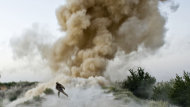Millions of dollars of U.S. gear meant to combat the threat of roadside bombs is being wasted in Pakistan which refuses to let the equipment leave its customs warehouses.
The U.S. procured 110 IED jammers for the Pakistani military
at a cost of nearly $23 million in 2009 in an effort to ease the threat
of the improvised explosive devices that have been the main cause of
U.S. casualties in neighboring Afghanistan and taken a toll on Pakistan authorities as well.
So far, not one of the jammers has been put to use, according to a
report released Wednesday by the Government Accountability Office.
The GAO
report found that "55 jammers were still in Karachi awaiting release
from Pakistani customs, and the remaining 55 jammers were being kept in
storage in the United States until the initial 55 were released."

The U.S. has had difficulty getting Pakistan to accept additional gear meant to help Pakistan reduce the IED threat.
"Other U.S. procured counter-IED equipment under review and still in U.S. storage includes kits for use by combined explosive exploitation cells, explosive ordnance disposal items, and portable trace explosive detectors," the report states.
Despite the frustrations of getting Pakistan to accept the equipment, the U.S. is buying more remote-controlled IED jammers for Pakistan at a cost of $12.1 million, as well as $64 million worth of route clearance vehicles, according to the GAO.
Combating the construction and detonation of IEDs is a major concern for
the U.S. military in Afghanistan. In 2011, 16,500 IEDs were discovered
or detonated against U.S. forces in Afghanistan. More than 80 percent of
those bombs were made from calcium ammonium nitrate, known as CAN, a
fertilizer that is made in Pakistan and smuggled into Afghanistan.
"Pakistan's ability to stem the flow of CAN and other IED precursors is a
life and death issue for U.S. and coalition troops in Afghanistan," the
GAO report said.
Nevertheless, the two countries' ability to cooperate on the issue has
actually worsened since the U.S. assassination of Osama bin Laden in
Pakistan.
"U.S. agencies have encountered some challenges to providing assistance
to Pakistan to counter IEDs, and events over the past 6 months have
strained this important bilateral relationship," the GAO concluded.
No comments:
Post a Comment